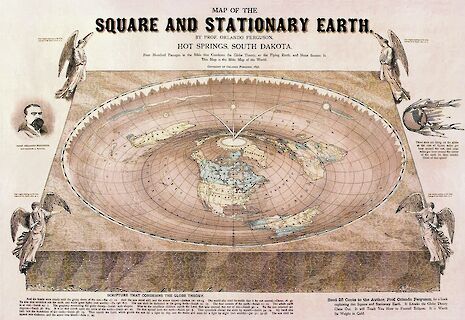Why don’t facts change people’s minds?
Ben Teasdale explores how cognitive psychology and neuroscience can help contextualise modern anti-science movements

Aron Ra, former President of the Atheist Alliance of America, has spent much of his life advocating secular politics and humanist values in America’s ‘Bible Belt’. When he addressed an audience in the Cambridge Union Library this past Wednesday, most of his anecdotes were of defeat. His arguments defending scientific facts – facts that support evolution, human-caused climate change, or a spherical earth – consistently failed to convince believers. His talk ended begging the question: Why?
Why don’t scientific facts change people’s minds? While the ascendance of post-truth politics is largely recent, psychologists have been studying similar phenomena for decades.
In the 1950s, social psychologist Leon Festinger famously studied the fallout of a failed doomsday claim. Dorothy Martin, a Chicago suburbanite turned prophet, earned a cult following after claiming ‘Guardians’ from another planet were coming to save them. Even after the date of the supposed apocalypse passed without reckoning, group members failed to admit any error. Instead, they doubled down on their proselytising.
These and other observations formed the foundation of Festinger’s theory of cognitive dissonance, the often extreme resistance to information contradicting personal beliefs, ideals or values: a psychological Lenz’s law.
Far from a fringe theory of flat-earthers and doomsday prophets, cognitive dissonance is an inherent aspect of human consciousness. Festinger, for instance, also studied people’s smoking habits: He observed that people addicted to smoking generally ignored facts about lung cancers. Meanwhile, he showed how they tend to seek out information relating tobacco and weight loss. In fact, a 2013 study from Yale University provides evidence that more intelligent people may be more adept at changing data to fit their preexisting beliefs. The mind resists change.
Yet, not all information is held equal before the brain. More recently, modern neuroscience research has visualized how our brains process political counterevidence differently.
Jonas Kaplan, a psychologist at the University of Southern California, presented facts and counterevidence to participants inside an fMRI scanner. Facts drew from topics as politically charged as abortion and immigration to less controversial topics, like fluoride. He found that new information did not change how people understood abortion and immigration; this was not the case for fluoride.
In his study, published in Scientific Reports in 2016, he showed that political challenges activated structures of the brain associated with social identity: “Challenges to political beliefs produced increased activity in the default mode network – a set of interconnected structures associated with self-representation,” Kaplan writes.
“When it comes to personal beliefs, facts don’t seem to matter much”
In addition to pathways associated with identity, political arguments also showed increased activation of emotional centers of the brain: “We also found that participants who changed their minds more showed less BOLD signal [an fMRI technique] in the insula and the amygdala when evaluating counterevidence.”
While neuroimaging studies such as this cannot reliably indicate mechanism, it is clear the brain has multiple ways of handling new information. Certain information, charged with political valence, becomes personal, physically intertwined with neural structures of emotion and identity. And when it comes to personal beliefs, facts don’t seem to matter much.
At first glance, cognitive dissonance seems unambiguously a flaw of human nature – an evolved cognitive defect rendering people resistant to understanding evolution. Following a crude logic of natural selection, organisms more adept at learning new information should stand a better chance of survival. A wolf-skeptic may not fare as well as modern-day climate change deniers. Yet, cognitive dissonance persists. If cognitive dissonance is really so bad, why hasn’t evolution corrected it?
Cognitive scientists Hugo Mercier and Dan Sperber, in their 2017 book The Enigma of Reason, provide an alternate theory of dissonance: The mind didn’t evolve with reason in mind. “Reason developed not to enable us to solve abstract, logical problems or even to help us draw conclusions from unfamiliar data,” Mercier and Sperber write. “Rather, it developed to resolve the problems posed by living in collaborative groups.” Cognitive dissonance didn’t evolve as an obstacle to rationality; it evolved to help people collaborate.
Benefits of collaboration are also accompanied with negative consequences of inter-group conflict. It is harder to celebrate the inherent human capacity for collaboration when groups are mobilising against a valued truth, whether it is climate change, evolution or vaccination.
At the end of the talk, audience members in the Cambridge Union Library greeted Aron Ra with applause. During the question and answer session, the fundamental premises of his lecture, ’Why do believers hate reality so much?’, went largely uncontested. I asked him how often creationists show up to his events: “Fewer and fewer,” he replied. Both groups, it seemed, had discovered they weren’t going to win the argument. As the audience funneled out of the Library, down the stairs, and past the Cambridge Union Debate Hall, I wondered how many had changed their minds
 News / Colleges charge different rents for the same Castle Street accommodation2 March 2026
News / Colleges charge different rents for the same Castle Street accommodation2 March 2026 News / News in Brief: waterworks, wine woes, and workplace wins 1 March 2026
News / News in Brief: waterworks, wine woes, and workplace wins 1 March 2026 News / Climate activists protest for ‘ethical careers policy’1 March 2026
News / Climate activists protest for ‘ethical careers policy’1 March 2026 News / Private school teacher who lied about Cambridge degree barred from teaching27 February 2026
News / Private school teacher who lied about Cambridge degree barred from teaching27 February 2026 News / Angela Merkel among Cambridge honorary degree nominees27 February 2026
News / Angela Merkel among Cambridge honorary degree nominees27 February 2026









